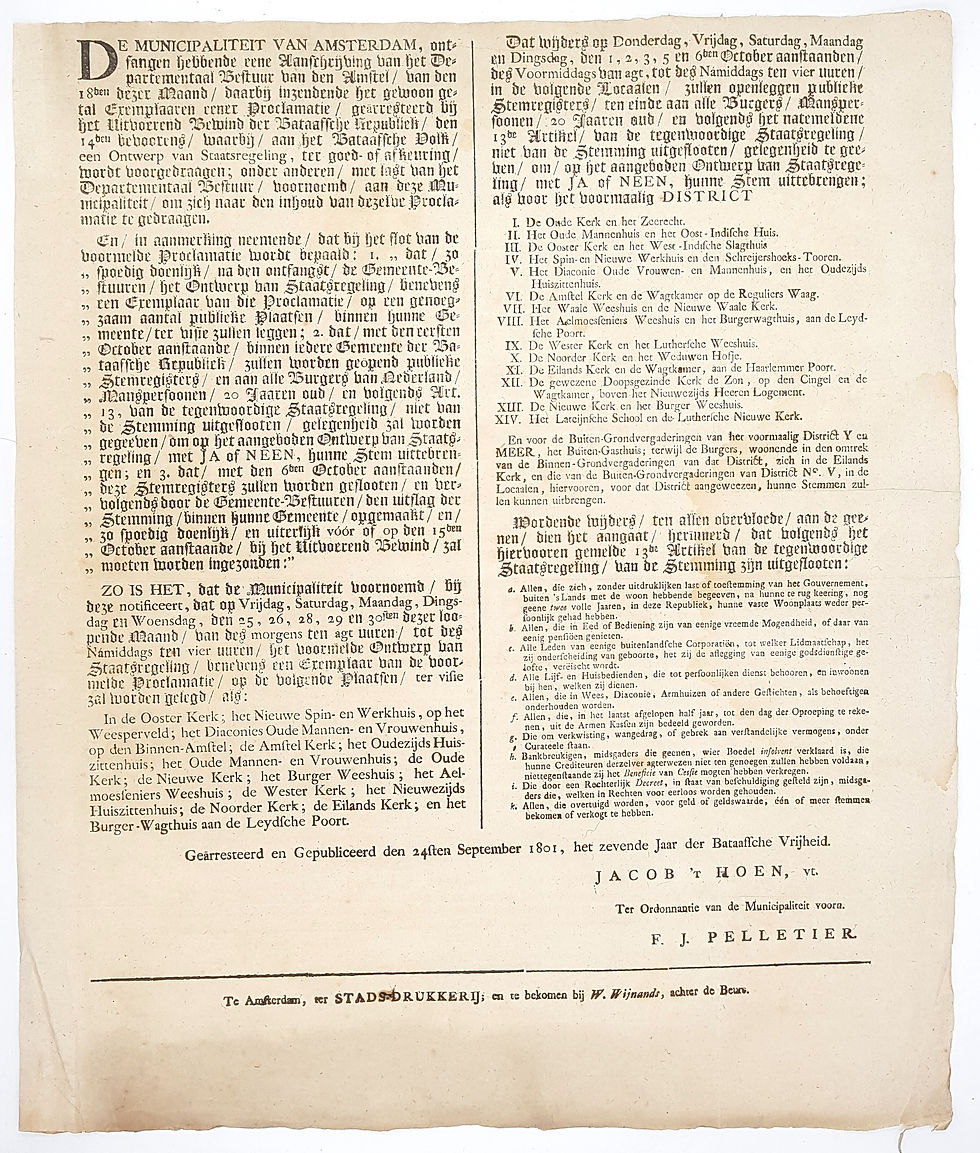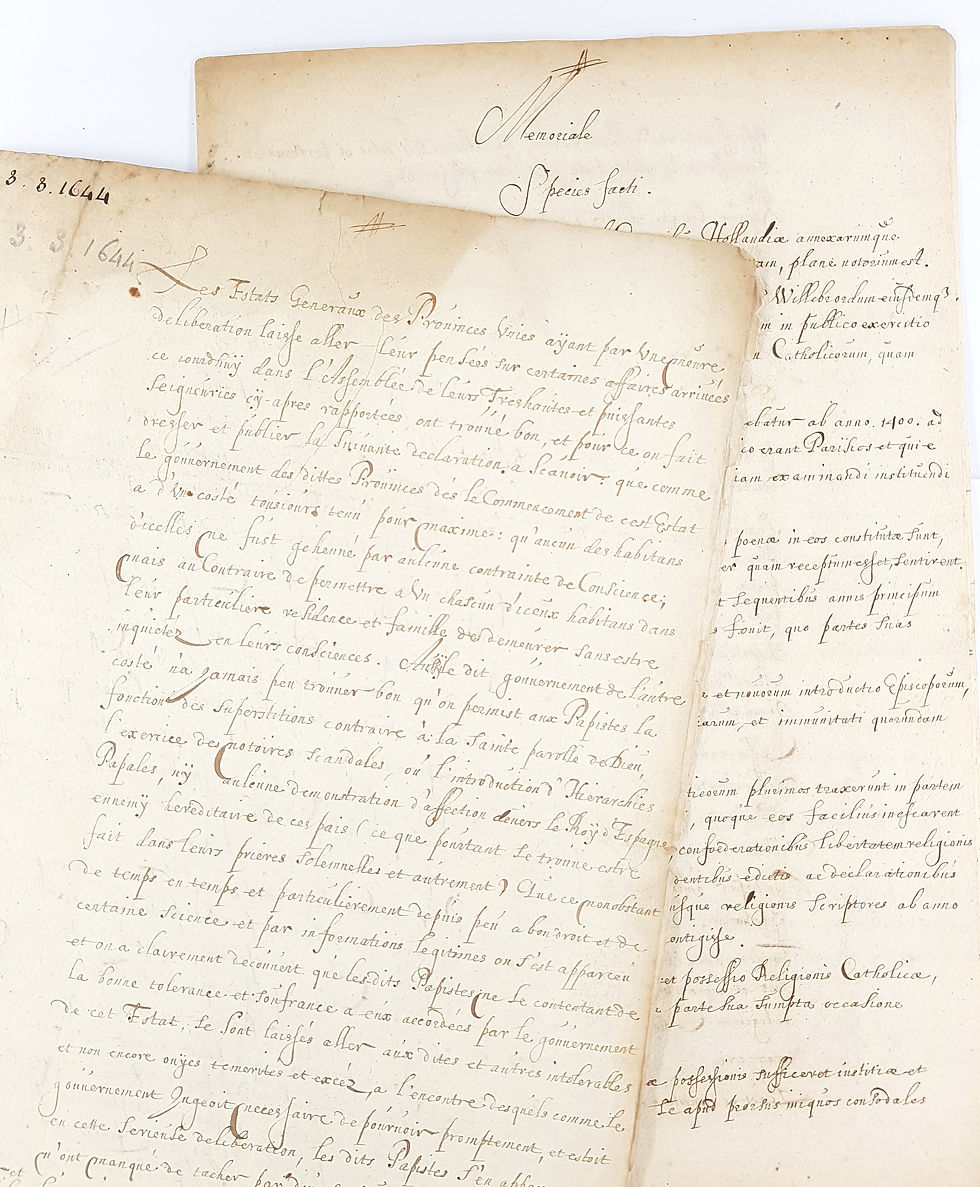An anonymous manuscript poem praising Johan van Oldenbarnevelt as a martyr for the state. With an anonymous washed pen and ink portrait, apparently copied from Willem Jacobsz. Delff’s 1617 engraving after the famous painting by Michiel van Mierevelt.
Dutch statesman Johan van Oldenbarnevelt (Amersfoort 1547– The Hague 1619) played a pivotal role in the Dutch revolt against Spain. From 1586 he was Land’s Advocate of Holland, becoming one of the most influential and powerful men of the Dutch Republic, supported by Stadtholder Maurice of Nassau. He dominated Dutch diplomacy for many years.
However, when the religious tensions between the Gomarists (or Contra-Remonstrants) and the Arminians (or Remonstrants) brought the Dutch Republic to the brink of a civil war, he was arrested for backing the Remonstrants, while Maurice supported the Contra-Remonstrants. Van OIdenbarnevelt was tried before a kangaroo court, and on 13 May 1619 he was sentenced to death and beheaded on the same day.
As was customary in the Dutch Republic this affair led to a war of words, producing numerous pamphlets in which Van Oldenbarnevelt was either decried or extolled (or, in some cases, both). In the present poem Van Oldenbarnevelt is praised, stating that he diligently served his country and died a martyr for the state:
Op d’Afbeelding van
IOHAN VAN OLDENBARNEVELT;
Advocaat van den Hove van Hollant.
Dit 's d Oldenbarnevelt; di in den Krijg en vrede
Zijn goet en bloet, ten diinst van’t Vaderlant, bestede;
Di Hollants eer bewaarde, en voor haar Vrijhijt sprak;
Di Spanjens dwinglandij en Maurits hoogmoet brak;
Di gelt verschafte en Raat; di zonder schult moest sneven,
En op het Hof-schavot verlaten kop en leven;
Verdoemt van Bastaard-Raat, als was hij een verraâr;
Di Got de wraak beval, en stiirf Staats-Martelaar.
(English translation by Maureen Warren:
This is Oldenbarnevelt, who, in war and peace,
Devoted his estate, and blood, in service of the Fatherland;
Who preserved Holland’s honor and spoke for her freedom;
Who shattered Spanish repression and MAURITS’ pride;
Who provided funds and advice; who without guilt had to die,
And on the Binnenhof-scaffold lose his head and life;
Doomed, by a Bastard-Council, as if he was a traitor;
Who trusted God would take revenge; and died a Martyr for the State.)
The poem (in a more modern spelling) and the portrait were published in a series of broadsides titled Namen der vier-en-twintig gedelegeerde rechters van den advokaat Johan van Oldenbarnevelt, dated 1619 by Muller, but Maureen Warren dates it ca. 1658 on the basis of extensive watermark research.
Warren argues that these broadsides were published by the Rotterdam Remonstrant publisher and printer Johannes Naeranus, who was forced into exile after Van Oldenbarnevelt’s fall from power. In 1634 Naerenus returned to the Netherlands, adamant to disseminating Remonstrant texts.
In 1663 and 1664 another pamphlet war broke out between Orangist and States Party polemicists. Some publishers used the above mentioned broadside and published the poem alongside another poem decrying Van Oldenbarnevelt, concluding that he “died a martyr for his own pride” rather than the state. Most of these broadsides, erroneously dated ca. 1625 by Knuttel, have the same title as the present manuscript: Op d’afbeelding van Joan van Oldenbarnevelt, and some also contain a poem by Vondel, a staunch defender of Van Oldenbarnevelt.
In these broadsides the poem is signed “C.D.”. Knuttel has suggested that these could be the initials of Amsterdam publisher, printer and engraver Cornelis Danckerts (1603-1656), which is impossible given the date of publication. Warren suggests that the poem could be written by the jurist Cornelis Bosch.
The present manuscript may very well have circulated in Remonstrant circles before the publication of the broadsides of the 1660s, or even before the Stadtholderless Period, when it was illegal to print the portrait of Van Oldenbarnevelt, let alone texts that radically praised the Land’s Advocate.
Martyr for the state: a manuscript poem extolling Van Oldenbarnevelt
[Cornelis Bosch?].
Op d’Afbeelding van Iohan van Oldenbarnevelt; Advocaat van den Hove van Hollant.
[The Netherlands], [2nd half 17th century].






![Monaco. Instructions et règles pour jouer au trente-et-quarante et a la roulette. Nice, [ca. 1890].](https://static.wixstatic.com/media/3b7891_1b416e317cd24882a102689eb59eebbc~mv2.jpg/v1/fill/w_980,h_1326,al_c,q_85,usm_0.66_1.00_0.01,enc_avif,quality_auto/3b7891_1b416e317cd24882a102689eb59eebbc~mv2.jpg)
![Monaco. Instructions et règles pour jouer au trente-et-quarante et a la roulette. Nice, [ca. 1890].](https://static.wixstatic.com/media/3b7891_4c41a6aa85f4449f95a4af59687db8d4~mv2.jpg/v1/fill/w_980,h_534,al_c,q_85,usm_0.66_1.00_0.01,enc_avif,quality_auto/3b7891_4c41a6aa85f4449f95a4af59687db8d4~mv2.jpg)


![Ordinaris staat van oorlogh over de laaste 9: maanden d'Anno 1752 [The Netherlands], [1752].](https://static.wixstatic.com/media/3b7891_3de4fd38d88f4ea1857a3ddfe41b390a~mv2.jpg/v1/fill/w_980,h_1273,al_c,q_85,usm_0.66_1.00_0.01,enc_avif,quality_auto/3b7891_3de4fd38d88f4ea1857a3ddfe41b390a~mv2.jpg)
![Ordinaris staat van oorlogh over de laaste 9: maanden d'Anno 1752 [The Netherlands], [1752].](https://static.wixstatic.com/media/3b7891_8e2158539f5049f292cffb774ba84a36~mv2.jpg/v1/fill/w_980,h_1307,al_c,q_85,usm_0.66_1.00_0.01,enc_avif,quality_auto/3b7891_8e2158539f5049f292cffb774ba84a36~mv2.jpg)




![Ludwig & Rosettchen. Eine Wundersame Historie. Gedruckt in dies Jahr. [Berlin], [1895-1896].](https://static.wixstatic.com/media/3b7891_c493b474f575433ca9fb47c39ab7cfba~mv2.jpg/v1/fill/w_980,h_1243,al_c,q_85,usm_0.66_1.00_0.01,enc_avif,quality_auto/3b7891_c493b474f575433ca9fb47c39ab7cfba~mv2.jpg)
![Ludwig & Rosettchen. Eine Wundersame Historie. Gedruckt in dies Jahr. [Berlin], [1895-1896].](https://static.wixstatic.com/media/3b7891_670c9488ba3142638c8a661abc55292d~mv2.jpg/v1/fill/w_980,h_1249,al_c,q_85,usm_0.66_1.00_0.01,enc_avif,quality_auto/3b7891_670c9488ba3142638c8a661abc55292d~mv2.jpg)
![Amsterdam den 10 January 1766 / Aamspraak[!] van den hooftofficier Isaak Sweers / Aan Johan Humbert synde gerabraakt. [Amste](https://static.wixstatic.com/media/3b7891_6f0fb5c10b4a491b99f4b5131fe76f34~mv2.jpg/v1/fill/w_980,h_1525,al_c,q_85,usm_0.66_1.00_0.01,enc_avif,quality_auto/3b7891_6f0fb5c10b4a491b99f4b5131fe76f34~mv2.jpg)
![Amsterdam den 10 January 1766 / Aamspraak[!] van den hooftofficier Isaak Sweers / Aan Johan Humbert synde gerabraakt. [Amste](https://static.wixstatic.com/media/3b7891_54a560ed64414b4eaf413a47317b0199~mv2.jpg/v1/fill/w_980,h_1551,al_c,q_85,usm_0.66_1.00_0.01,enc_avif,quality_auto/3b7891_54a560ed64414b4eaf413a47317b0199~mv2.jpg)
![KZ Sachsenhausen. Reichenbach, VEB Bild und Heimat, [1960].](https://static.wixstatic.com/media/3b7891_67a8edb2009a4815931d5702f1268f1d~mv2.jpg/v1/fill/w_980,h_693,al_c,q_85,usm_0.66_1.00_0.01,enc_avif,quality_auto/3b7891_67a8edb2009a4815931d5702f1268f1d~mv2.jpg)
![KZ Sachsenhausen. Reichenbach, VEB Bild und Heimat, [1960].](https://static.wixstatic.com/media/3b7891_2e7c3acf3007401a86d673555b542ba4~mv2.jpg/v1/fill/w_980,h_1484,al_c,q_85,usm_0.66_1.00_0.01,enc_avif,quality_auto/3b7891_2e7c3acf3007401a86d673555b542ba4~mv2.jpg)
![Simcha van Frank. Mensen achter ramen. Herinneringen. Hadera, [Self Published], 1994.](https://static.wixstatic.com/media/3b7891_05720e3e77b34996a7c7d40475480a3b~mv2.jpg/v1/fill/w_980,h_1202,al_c,q_85,usm_0.66_1.00_0.01,enc_avif,quality_auto/3b7891_05720e3e77b34996a7c7d40475480a3b~mv2.jpg)
![Simcha van Frank. Mensen achter ramen. Herinneringen. Hadera, [Self Published], 1994.](https://static.wixstatic.com/media/3b7891_819c28f64d6a42b4a01fb6e7f0630f5e~mv2.jpg/v1/fill/w_980,h_1324,al_c,q_85,usm_0.66_1.00_0.01,enc_avif,quality_auto/3b7891_819c28f64d6a42b4a01fb6e7f0630f5e~mv2.jpg)


![The black album. Series 1. Tel Aviv, The Anti-Nazi League (printed by the Arieli Press), [Arpil? 1940].](https://static.wixstatic.com/media/3b7891_863d81886ac8445c8bc893d407822e95~mv2.jpg/v1/fill/w_980,h_1345,al_c,q_85,usm_0.66_1.00_0.01,enc_avif,quality_auto/3b7891_863d81886ac8445c8bc893d407822e95~mv2.jpg)
![The black album. Series 1. Tel Aviv, The Anti-Nazi League (printed by the Arieli Press), [Arpil? 1940].](https://static.wixstatic.com/media/3b7891_ccfaac8b87324d7caa27b0958fa8eecd~mv2.jpg/v1/fill/w_980,h_641,al_c,q_85,usm_0.66_1.00_0.01,enc_avif,quality_auto/3b7891_ccfaac8b87324d7caa27b0958fa8eecd~mv2.jpg)



